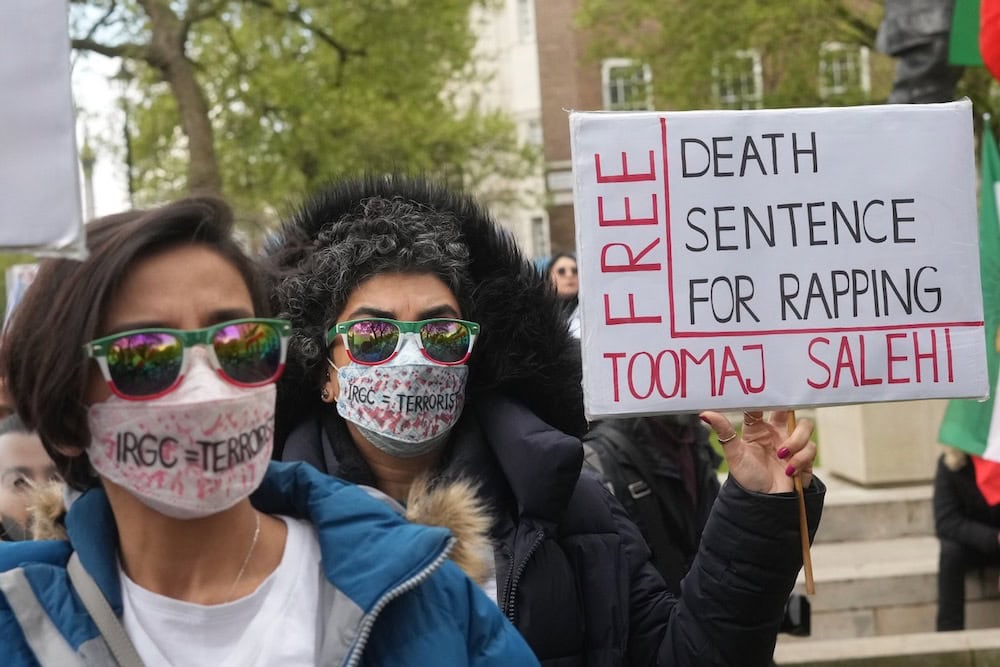Authorities convicted rapper Toomaj Salehi for a song he wrote and sentenced him to death.
This statement was originally published on gc4hr.org on 23 May 2024.
Two Iranian musicians have been sentenced over songs they created during protests in the wake of the death of woman human rights defender Mahsa Amini, who died on 16 September 2022 after a beating for reportedly being in violation of Iran’s compulsory hijab law. Alarmingly, one of them has been sentenced to death, and recent reports allege he has been tortured in prison.
On 24 April 2024, Iranian authorities convicted rapper Toomaj Salehi for a song he wrote, and sentenced him to death on a charge of “corruption on earth.” The 33-year-old musician faces execution for expressing support for women’s rights, particularly in the wake of the Mahsa Amini protests. Salehi is known for using his music to criticise the Iranian authorities, in songs such as ‘Mouse Hole’, ‘Turkmenchay’ and ‘Pomegranate’, which highlight issues like corruption, poverty, and state executions.
He won the Index on Censorship’s Freedom of Expression Award in the arts category in 2023, and Index on Censorship has joined Salehi’s family and filed an appeal with two United Nations Special Rapporteurs over the death sentence. Over 100 musicians, artists and cultural figures called for his release on 10 May 2024.
What is particularly shocking is that Salehi was first arrested in October 2022 and sentenced to six years in prison in the same case, but in November 2023, Iran’s Supreme Court struck down the sentence and released him on bail, and referred him back to the Court of First Instance.
While he was out on bail, he published a video on his YouTube page describing the torture he faced while in detention, including beatings resulting in fractures, and solitary confinement. According to Amnesty International, “He said agents injected him with an unidentified substance in his neck and subjected him to psychological torture, including solitary confinement for eight [or] nine months.”
In a separate case, Iranian singer-songwriter Shervin Hajipour was sentenced to over three years in prison on 01 March 2024, over allegations of creating a protest anthem for Mahsa Amini that authorities deemed as “inciting people to riot,” a charge he contests as unjust.
Amid the 2022 protests sparked by the death of Amini, Hajipour debuted a song titled ‘Baraye’. For this track, he earned the Special Merit Award for Best Song for Social Change at the 2023 Grammys, presented by Jill Biden.
“This song became the anthem of the Mahsa Amini protests, a powerful and poetic call for freedom and women’s rights,” Biden said at the ceremony, adding “Shervin was arrested, but this song continues to resonate around the world with its powerful theme: Women, life, freedom.”
Subsequently, Iranian authorities imposed a two-year travel ban on him and ordered him to compose a song addressing “US crimes,” as detailed in a report by the Human Rights Activists News Agency.
Through artists’ experiences, the stories of Hajipour and Salehi highlight the intersectionality of injustice in its social form and the fundamental rights in Iran. They express the evident suppression of protests and artistic freedom within the country via music.
These individual stories highlight the musicians’ involvement in the social and human rights movements and the paradox of their recognition on international platforms, which results in their condemnation by the Iranian authorities for the very same acts.
Recommendations:
The Gulf Centre for Human Rights (GCHR) strongly condemns the sentencing and imprisonment of Shervin Hajipour and Toomaj Salehi, and calls for the death penalty against Salehi to be overturned.
GCHR urges authorities in Iran to:
- Urges the authorities in Iran to immediately and unconditionally release all women human rights defenders, journalists, and activists in Iran;
- Repeats its demands for a thorough, independent, impartial, and transparent investigation into the death of 22-year-old woman human rights defender Mahsa Amini,
- Urges Iran to halt the imposition of unjust sentences and end systematic targeting of musicians and their creative expressions.



